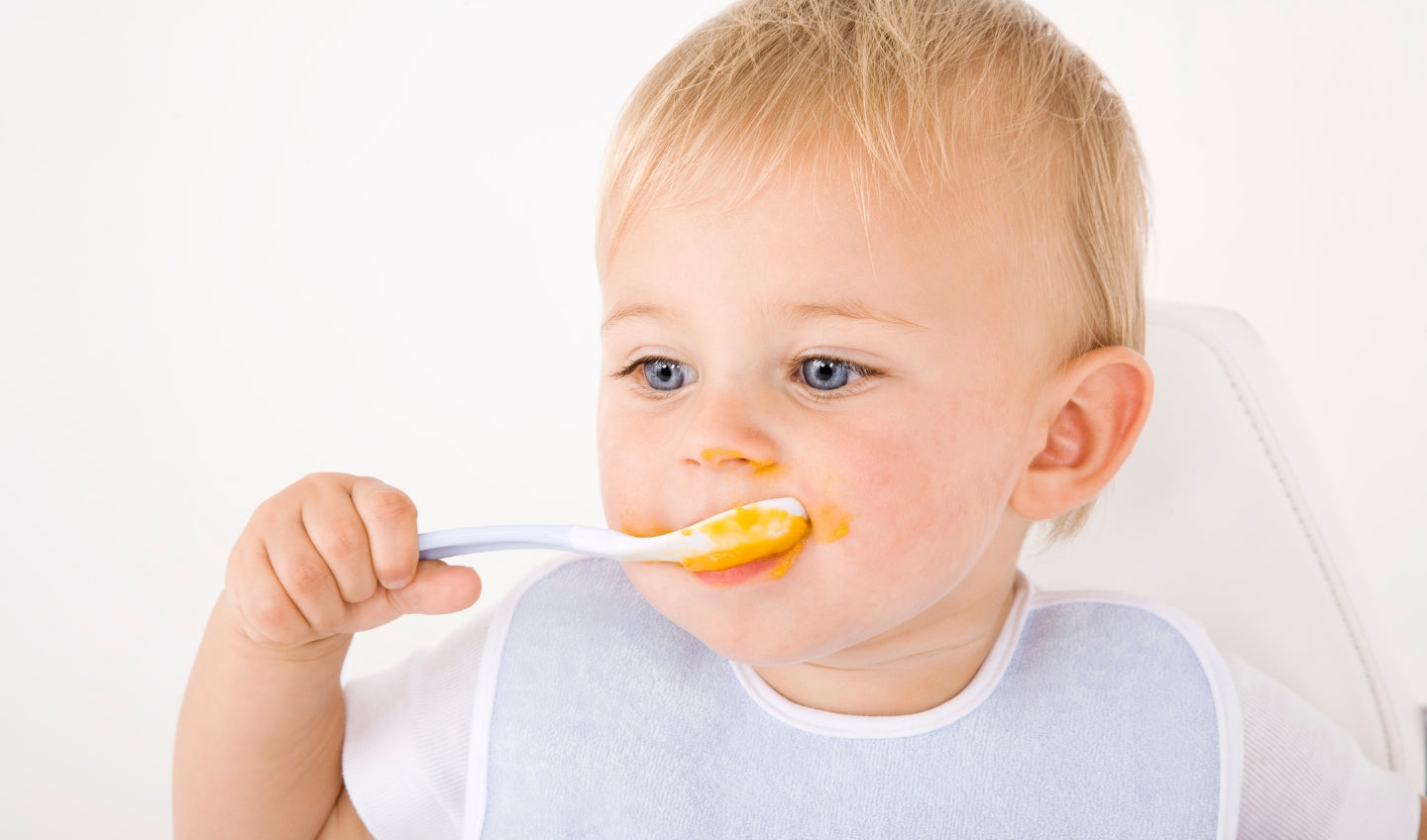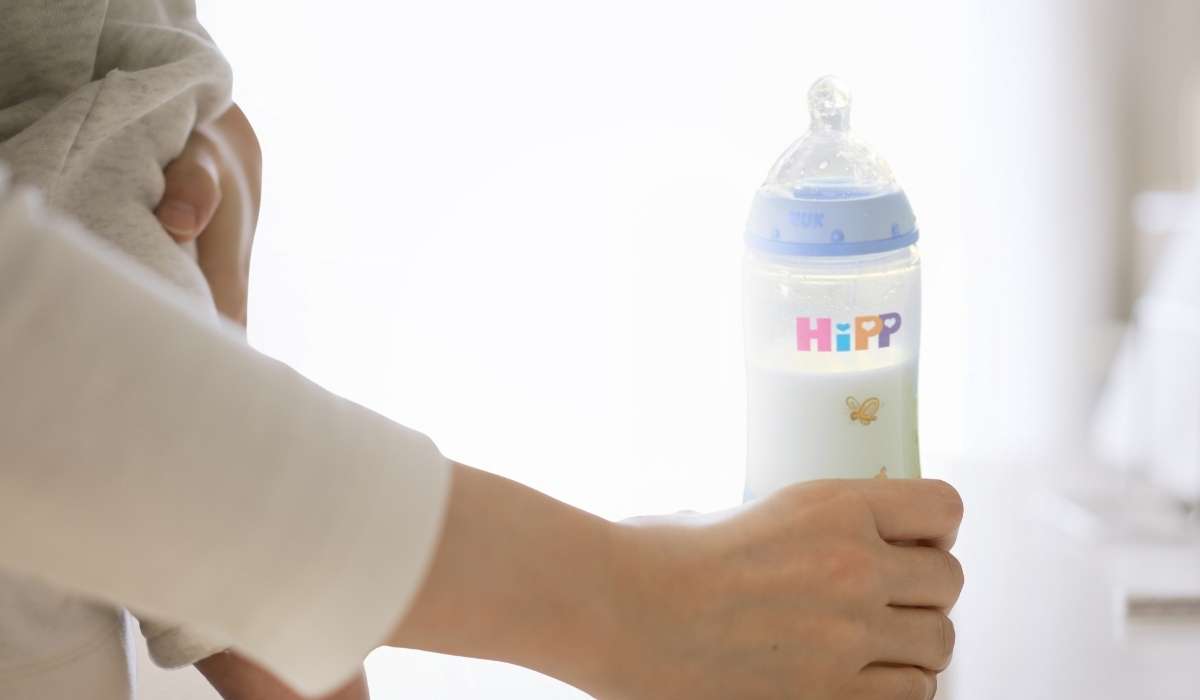Transitioning from baby formula or breast milk to solid food is a significant milestone. Naturally, many parents can feel both anticipation and uneasiness.
Many questions start to pop up at this time, from when is it time for my baby to stop drinking formula to how do I know they are ready and, of course, how do I ensure a safe and comfortable transition?
Today, you can put your worries to rest as we'll be answering all these questions and more! This guide will cover the main steps and rules of transitioning from milk to solids. Plus, we'll share some tips on how to recognize your baby's readiness signs and strategies for how to make the transition easier for both of you.
So, if you want all the ins and outs of this milestone for your baby, keep on reading!
Contents
- Understanding Infant Nutrition: The Importance of Drinking Formula and Eating Solid Foods
- When to Stop Formula: Recommendations and Guidelines
- Should You Switch From Formula to Milk at 12 Months?
- What About Toddler Formula?
- Is Your Little One Ready for Solids? Signs to Look For
- Transitioning to Solid Food: A Step-by-Step Guide
- Frequently Asked Questions About Stopping Formula
Understanding Infant Nutrition: The Importance of Drinking Formula and Eating Solid Foods
As you know, the first year of infant nutrition plays a crucial role in your little one's well-being. Your baby needs nourishment from essential nutrients to allow them to gain weight properly and support their overall development. Only breast milk or baby formula can provide your little one with all the vital nutrients they require during the very first stages of life.
Typically, introducing baby food is done gradually when the little one turns 4-6 months. It's important to know that your baby's digestive system can't handle solid food before they turn at least4 months, and they should possess the necessary motor skills required to eat solids.
At first, solids should act as a complement to infant formula or breast milk by providing additional nutrients that baby formula or breast milk does not contain. This will also help your baby get used to new foods, allowing them to stop drinking formula or breast milk more easily once the time comes.
When to Stop Formula: Recommendations and Guidelines
Knowing when your baby can stop drinking formula can help you plan ahead to make the transition to other foods gradual and smooth! So let's take a look at the guidelines for slowly weaning off of formula.
When to Introduce Solids
As we mentioned already, it's recommended to wait until your baby turns at least 4 months old before introducing solids alongside breast milk or formula feeding. However, your child should begin eating complementary foods by 6 months to receive adequate nutrition.
When It's Time for Baby to Stop Drinking Formula
According to the National Health Institute (NHS), it's recommended to keep nursing or providing your child with infant formula until they reach at least their first birthday, after which you can introduce whole milk instead.
As your baby consumes more solids, their demand for milk will gradually lessen. So once your child starts having substantial solid meals multiple times daily, they may even choose to forgo a milk feed entirely.
It's important to be aware that if you are breastfeeding your little one, the benefits of nursing will continue for as long as the practice persists for both mother and child. So you don't need to wean your child off breast milk until you're both ready!
Should You Switch From Formula to Milk at 12 Months?
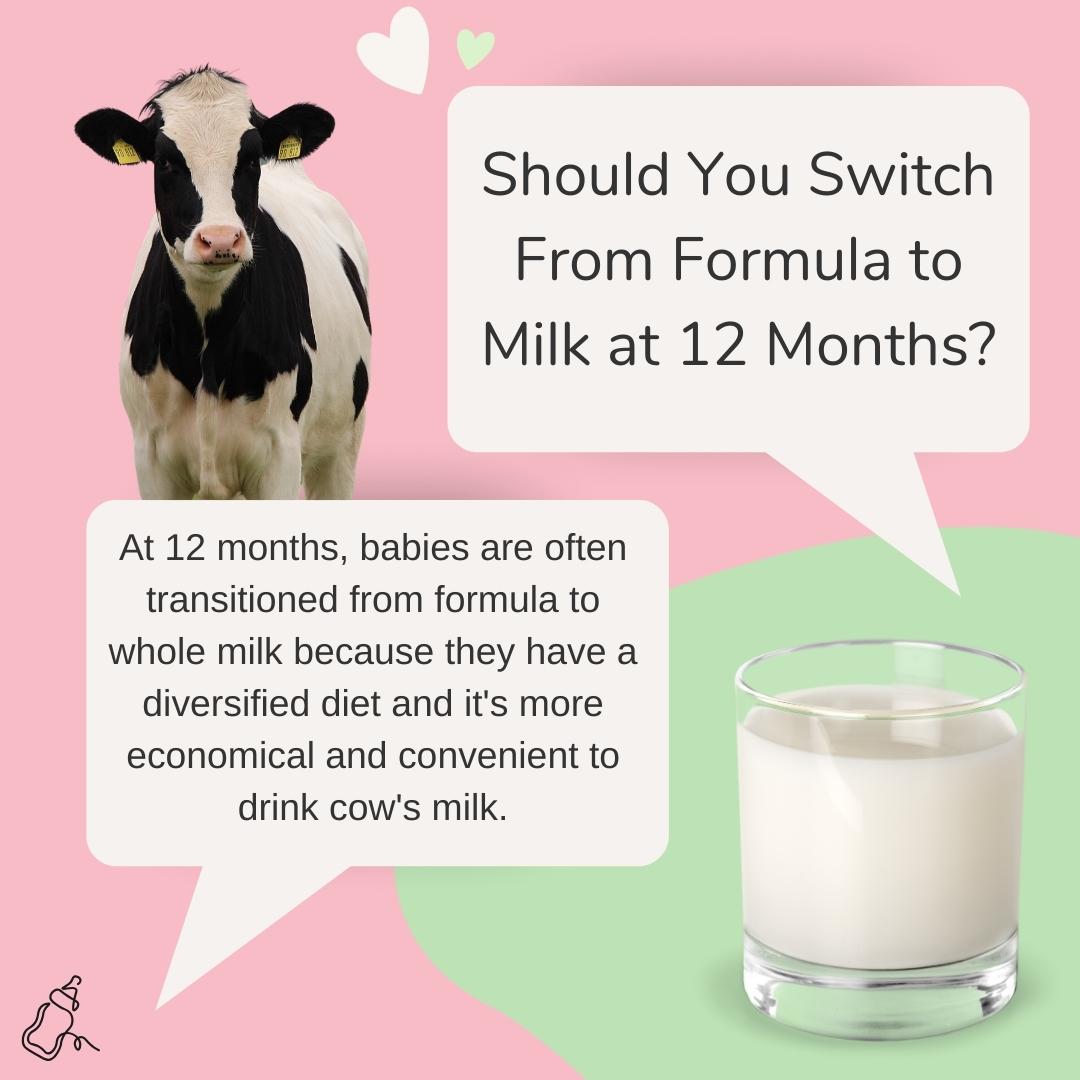
At 12 months of age, babies are often transitioned from formula to whole milk for several reasons. By this age, most toddlers have diversified their diet and are receiving a good portion of their nutrients from a variety of solids. In this case, formula becomes less necessary.
Whole milk becomes a beneficial choice as it provides essential nutrients that toddlers need. It's rich in dietary fats, which are crucial for brain development, growth, and energy. Whole milk is also an excellent source of calcium and vitamin D, which are needed for strong, healthy bones and teeth.
Moreover, it's more economical and convenient to drink cow's milk. Unlike when babies drink formula, whole milk doesn't require preparation and can be served straight from the fridge. Nonetheless, it's always important to discuss any dietary changes with your child's pediatrician to ensure the best nutritional balance for your baby's needs!
What About Toddler Formula?
While whole milk is often recommended for healthy toddlers from 12 months onwards by health organizations such as the AAP, there's also a place for toddler formula in certain situations.
Toddler formulas can be beneficial for children with specific nutritional needs or dietary restrictions or if they're not consuming a wide variety of foods. Moreover, straight cow's milk may not provide all the nutrients of a toddler milk; for instance, iron and DHA are often found in higher amounts in toddler milks.
It's crucial to remember that every child's nutritional needs are unique, and what works for one might not work for another. Always consult with a pediatrician before introducing formula to toddlers.
Is Your Little One Ready for Solids? Signs to Look For
Other than being between 4 and 6 months of age, you should look out for the following signs as an indication that your child is ready to begin solid food:
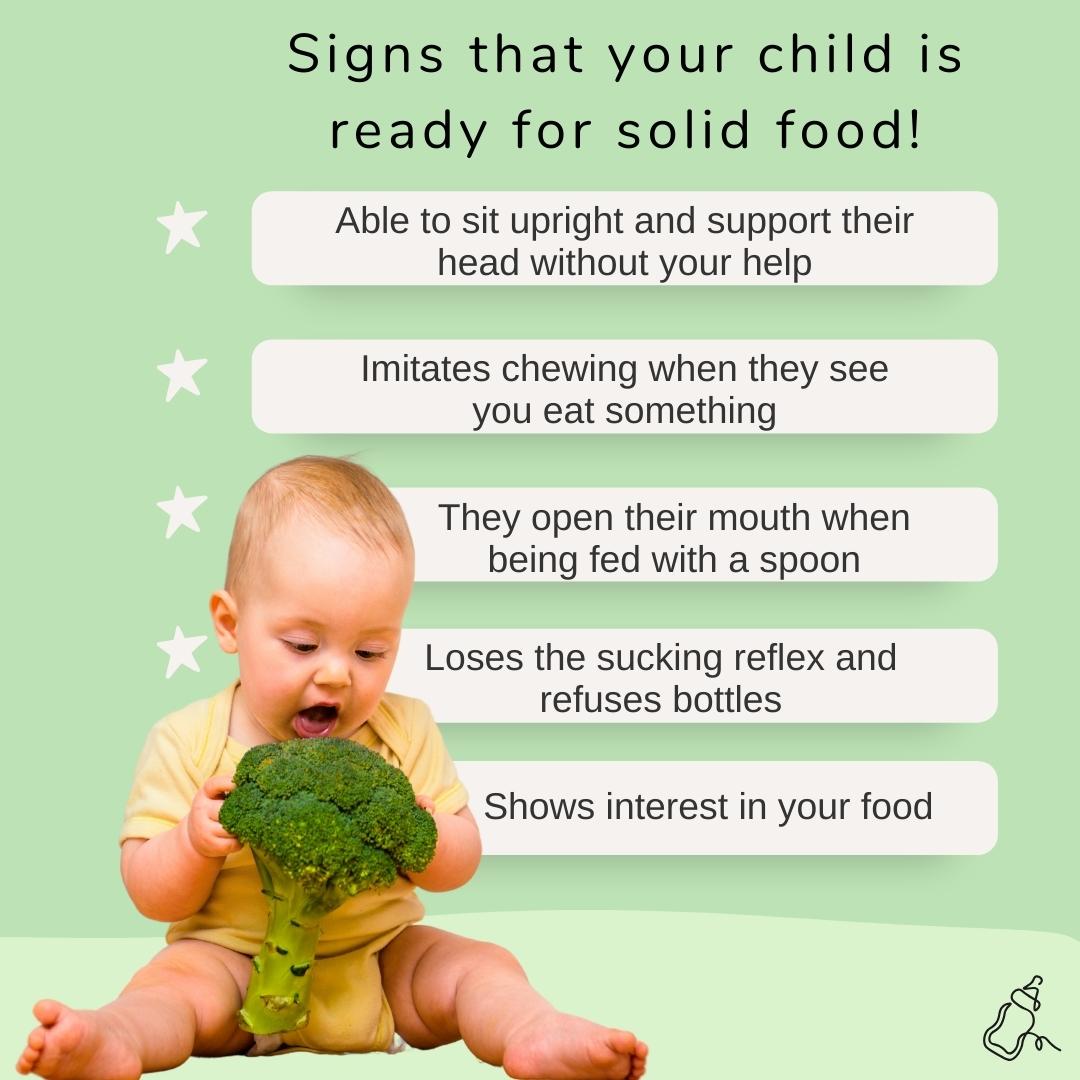
- Your little one is already able to sit upright and support their head without your help (or with little help)
- Your child shows interest in your food (for example, tries to grab it or stares when you eat)
- Your baby imitates chewing when they see you eat something
- They open their mouth when being fed with a spoon
- Your child loses the sucking reflex and refuses bottles (or doesn't drink formula with the same enthusiasm as before)
Transitioning to Solid Food: A Step-by-Step Guide
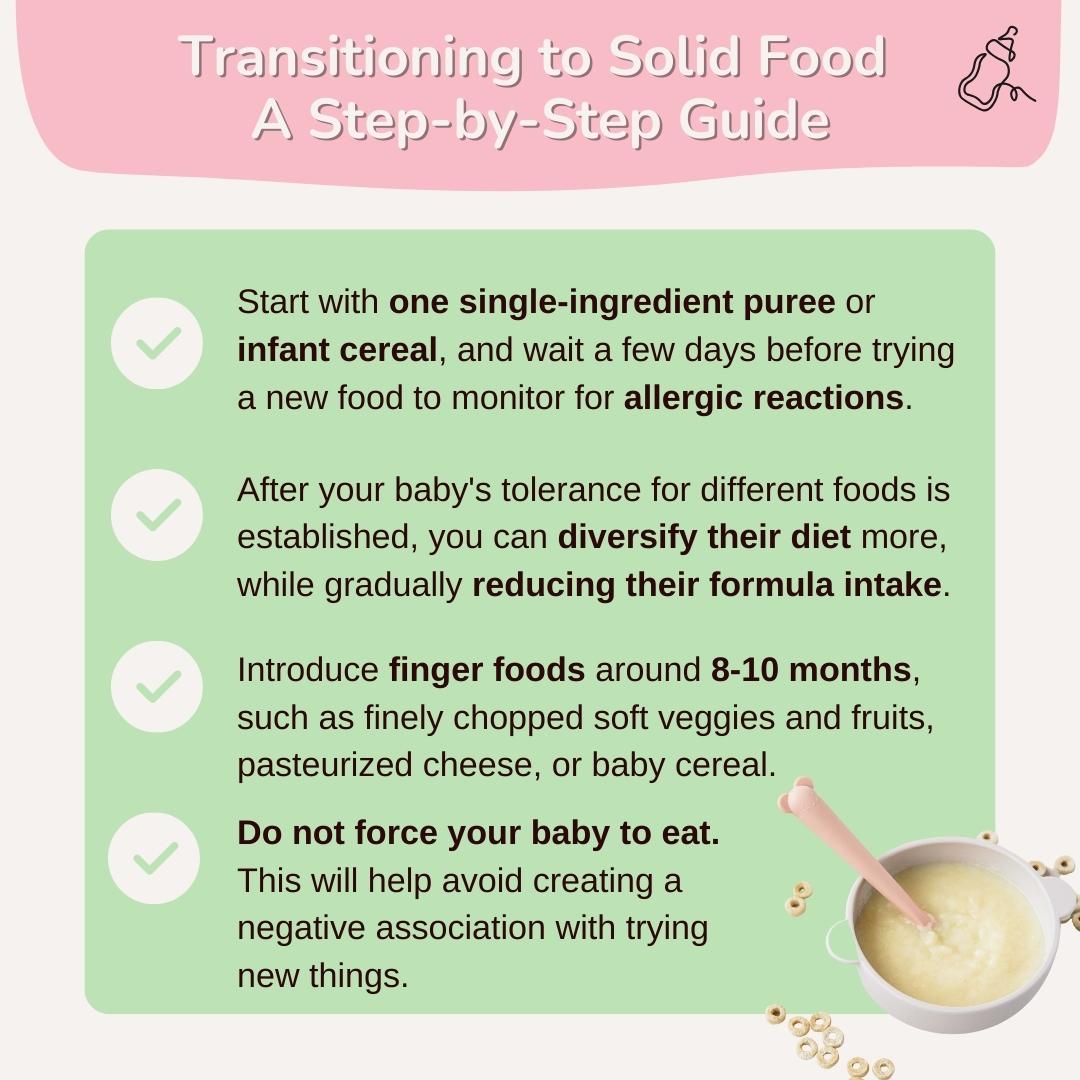
There are certain rules you should stick to when introducing solids. First of all, start simple. One single-ingredient puree or infant cereal at a time is more than enough. Make sure to wait a few days before trying a new food. This will help you notice signs of allergic reactions or food intolerance in your little one.
After your baby's tolerance for different foods is established, you can diversify their diet more. Make sure you combine different food groups so that your child gets all the essential nutrients they need. At the same time, you can start gradually reducing your baby's formula intake.
By 8-10 months, most babies can start eating finger foods. You can try finely chopped soft veggies and fruits, toddler crackers, pasta, well-cooked and chopped meat, pasteurized cheese, or baby cereal.
Another important rule is not to force your baby if they refuse to try new food. You can simply try again in a few days. This will help avoid creating a negative association with trying new things when you start weaning.
When can I start giving my baby other drinks?
Once your baby starts solids, around 6 months of age, you can begin to introduce other drinks sparingly into their diet. Water is a safe choice to keep them hydrated, but remember, breast milk or formula should still be their primary drink.
As your baby approaches their first birthday, you can start transitioning them to whole cow's milk. If allergies or dietary preferences require an alternative, fortified oat milk can be considered, but should not completely replace breast milk or formula for children under 5 due to its lower protein and fat content.
Juice can also be introduced around this time but should be limited due to high sugar content. Always opt for 100% fruit juice and dilute it with water to lessen the sugar load. As always, consult with your pediatrician to ensure these choices align with your baby's specific nutritional needs.
Frequently Asked Questions About Stopping Formula
Navigating the transition from formula to other drinks and solid food can be a time of uncertainty for many parents. It's completely natural to have numerous questions about when and how to begin this process.
To aid you on this journey, we've compiled a list of the most frequently asked questions about stopping formula, complete with comprehensive answers!
Do babies need formula after 12 months?
Healthy toddlers don't really need to continue drinking formula after they turn 1 and can switch to whole milk alongside a diversified and nutritious diet of healthy foods. However, if your doctor recommends it, toddler milk can be an alternative to whole cow's milk.
Why does a baby need to be 1 before they can drink milk?
Until your baby reaches their first birthday, their digestive system isn't mature enough to process plain cow's milk.
Which should I choose, Stage 3 formula or whole milk?
If your baby is younger than 12 months, you should stick to Stage 3 formula. After that, in most cases, it's okay to wean your baby off formula and switch to whole milk.
However, if your little one has certain allergies, medical conditions, or other special dietary requirements, a Stage 3 formula may be recommended. Every child is unique, so always follow the advice of your pediatrician.
Can I stop formula and introduce solids earlier than the recommended age?
No. Introducing solids before your baby turns at least 4 months can be dangerous for their health. Moreover, babies require breast milk or formula for their first 12 months of life.
How do I know if my baby is getting enough nutrients from solid food?
Regular bowel movements and a healthy weight gain are the signs your baby is getting enough nutrients from solids. If you're worried about your baby's diet, consult your pediatrician.
What should I do if my baby refuses to eat solid food?
First off, don't force your little one. Toddlers are notoriously picky, but you may have better luck trying again in a few days. You can also show them how you eat first, allowing your child to mimic you. It's also crucial to leave enough time between feedings to ensure your baby comes to the table hungry.
Wrapping Up: Navigating the Transition from Formula to Solid Foods
Moving from formula to solids marks a significant step in your baby's growth. It's understandable to have some worries about this transition.
By adhering to key guidelines, ensuring your baby is ready for solid foods, and choosing high-quality options, you can navigate this phase with confidence.
Remember, seeking advice from a healthcare professional can provide additional reassurance. Together, you can ensure your baby receives optimal nutrition during this exciting new phase!
Breast milk is the best source of nutrition for babies. Before altering your baby's diet or feeding routine, consult your healthcare provider for personalized recommendations. The information in this article is strictly for informational purposes and is not a substitute for medical advice.


